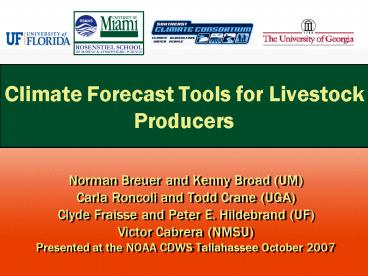Climate Forecast Tools for Livestock Producers
Title:
Climate Forecast Tools for Livestock Producers
Description:
... and rates of conception in cows and growth rate of calves ... Cow-calf is different from single crop. Multiple variables require better statistical methods ... –
Number of Views:43
Avg rating:3.0/5.0
Title: Climate Forecast Tools for Livestock Producers
1
Climate Forecast Tools for Livestock Producers
- Norman Breuer and Kenny Broad (UM)
- Carla Roncoli and Todd Crane (UGA)
- Clyde Fraisse and Peter E. Hildebrand (UF)
- Victor Cabrera (NMSU)
- Presented at the NOAA CDWS Tallahassee October
2007
2
Outline
- Three Case Studies
- Beef Cattle in NC Florida
- Dairy DSS Process
- Beef Cattle and Forage DSS Process
- Lessons
- Challenges
3
Livestock and Forage in Florida
- 1.7 million head of cattle and calves
- Cattle and calves 330M
- Milk and milk products 371M
- Forage and hay 516M
- Total 1.22B
4
Livestock and Forage in Florida
- Frequent drought conditions
- Severe drought in 2006 and 2007 caused pasture
and hay shortage - 2006 hay production was record low for the past
20 years - Most cattlemen were forced to feed supplements
- Hay farmers experiencing high fertilizer prices
- To cope with drought, ranchers were weaning early
or selling off some animals at lower than average
weights
5
Research Sites
Case Studies
Dairy
Beef Cattle
Cow-calf
Map Google Earth
6
Methodology
7
SECC Co-Development Framework
8
Beef Cattle North Central Florida
Case study 1
- Four Sondeos (multidisciplinary, conversational,
rapid team surveys) conducted, 1999-2001 - Linear program developed from secondary data,
Sondeo information, and interviews - Models calibrated using Participatory Linear
Programming (PLP) - DSSAT and Ceres used for summer and winter
pasture crop models, respectively, and connected
to the model through stocking rate
9
Steps in Participatory DSS Building
Case study 2
- Identify needs through initial contacts with
producers - Create or adapt models
- Develop prototype DSS using secondary data
- Discuss model with stakeholders
Cabrera, Breuer et al. 2006, submitted
10
Steps in Participatory DSS Building
Case study 2
- Include farmers, consultants, extension agents,
government officials, and university faculty in
process - Elicit input on structure and function of
systems, coefficients, parameters, and individual
modules - Develop final DSS and return to stakeholders for
validation
Cabrera, Breuer et al. 2006, submitted
11
Dairy DS participation in North Florida
Case study 2
- We conducted
- 26 separate stakeholder interactions of
- different types (Sondeos, focus groups,
- meetings)
- 90 persons of which
- 38 were farmers or farm managers
12
Social Learning
Case study 3
- Collective action rather than individual
- Issues and activities of central concern to
community members - Scientists, practitioners, and producers
co-develop technologies - Increased likelihood of adaptation through
adoption of climate-based DSS
13
Background
Case study 3
- Declining profits
- Increased cost of energy (pumping)
- Increased transportation cost
- Pressure from increasing land prices
- Variable climate
- Frequent drought or flood
14
Learning Community
Case study 3
- Buck Island Ranch - MacArthur Agro-ecology
Research Center - Ona Range Cattle Research and Education Center
- Private cattle ranchers in the vicinity
15
Learning Community
Case study 3
- Objective
- Develop methods to help cattle ranching remain
viable in South Florida with climate-based DSS - For this strong climate component needed
16
Cow-Calf Production in SFLDrought and Flood
Case study 3
- An old-timer saying goes In SFL you are never
more than 3 days away from a flood or 3 weeks
away from a drought. - Research needed
- Climate-production relationships
- Climate and ranch economics
- Potential for hay production
- Sod production
- Sale of water retention or release rights to SFWMD
17
Framework for Social Learning Process
Case study 3
Adapted from Christensen and Sriskandarajah 2006
18
Expected Results of Social Learning
Case study 3
- Development of local capacity
- Increased understanding of relationship between
climate and rates of conception in cows and
growth rate of calves - Operational, open access DSS
- Scientific papers
- Sustainability of industry (label of origin)
19
Results
Beef cattle CFL
Dairy cattle NFL
Beef cattle SFL
20
Climate-based forecasts could aid ranch
management decisions
Case study 1
- Planting and fertilizing rye-grass mixtures only
in years when good stocking possibilities exist - Savings from buying hay ahead of time before a
dry, cold winter - More plentiful stocking during good rainfall
winters
21
In dairy, ENSO phases affect nitrogen leaching
and biomass production
Case study 2
- N-leaching is 10 higher during El Niño years
- N-leaching is closely correlated with
ENSO-related with occurrence of extreme rainfall
events - Potential responses are adjusting crop sequences
to increase N-uptake while maintaining biomass
necessary for production
Cabrera, Breuer et al. 2006
22
Lessons
- Participation is a good beginning
- Social learning is a logical progression from
past research - Potential adaptations exist
- Co-development aids adoption
- Value of climate information may be easier to
measure community level where adaptations can be
well documented
23
Challenges and Opportunities
- Cow-calf is different from single crop
- Multiple variables require better statistical
methods - Climate plays an important role
- Users are intensely interested
- A multidisciplinary approach is needed
- Learning communities must be facilitated in order
to develop































